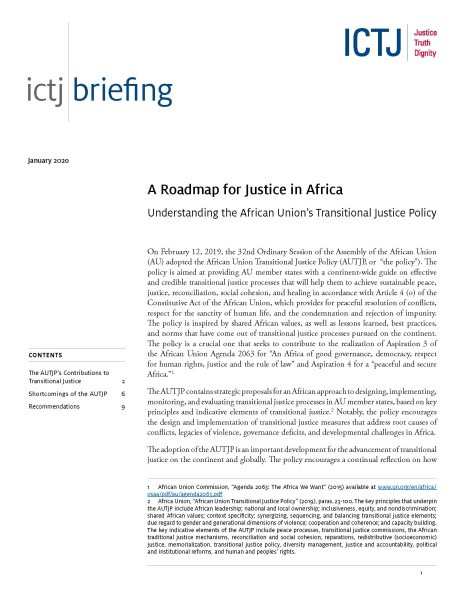We work side by side with victims to obtain acknowledgment and redress for massive human rights violations, hold those responsible to account, reform and build democratic institutions, and prevent the recurrence of violence or repression.
A Roadmap for Justice in Africa: Understanding the African Union’s Transitional Justice Policy
On February 12, 2019, the Assembly of the African Union adopted the African Union Transitional Justice Policy. The policy serves as a guide for member states on effective and credible transitional justice processes to achieve sustainable peace, justice, reconciliation, social cohesion, and healing. ICTJ welcomes the policy and encourages stakeholders to consider its guidance. This position paper presents the policy’s key contribution, raises some concerns about its practical implementation, and presents recommendations for next steps.

On February 12, 2019, the Assembly of the African Union (AU) adopted the African Union Transitional Justice Policy (AUTJP). The policy is aimed at providing AU member states with a continent-wide guide on effective and credible transitional justice processes that will help them to achieve sustainable peace, justice, reconciliation, social cohesion, and healing. The policy is inspired by shared African values, as well as lessons learned, best practices, and norms that have come out of transitional justice processes pursued on the continent.
The AUTJP contains strategic proposals for an African approach to designing, implementing, monitoring, and evaluating transitional justice processes in AU member states, based on key principles and indicative elements of transitional justice. Notably, the policy encourages the design and implementation of transitional justice measures that address root causes of conflicts, legacies of violence, governance deficits, and developmental challenges in Africa.
The adoption of the AUTJP is an important development for the advancement of transitional justice on the continent and globally. The policy encourages a continual reflection on how to achieve the objectives of transitional justice, particularly in light of new patterns of violations and conflict as well as the specificity of each context. At a time when transitional justice tends to be implemented using a simplistic or mechanistic approach that focuses more on projects and institutions instead of transitional justice objectives and outcomes, ICTJ welcomes the AUTJP as an important contribution. The policy reminds policymakers and practitioners that transitional justice is not a formula to be imposed from the outside or from above.
ICTJ encourages stakeholders to consider the AUTJP as guidance for advancing transitional justice processes across the African continent. The policy stresses the importance of the principles of local ownership, inclusiveness, context specificity, and sustainability when designing and implementing transitional justice initiatives.
The challenge, however, lies in the feasibility of designing and implementing transitional justice initiatives that fully incorporate all of the principles highlighted in the policy. With that in mind, this position paper presents the key contributions of the AUTJP, raises some concerns about the policy’s practical implementation, and presents recommendations for next steps.